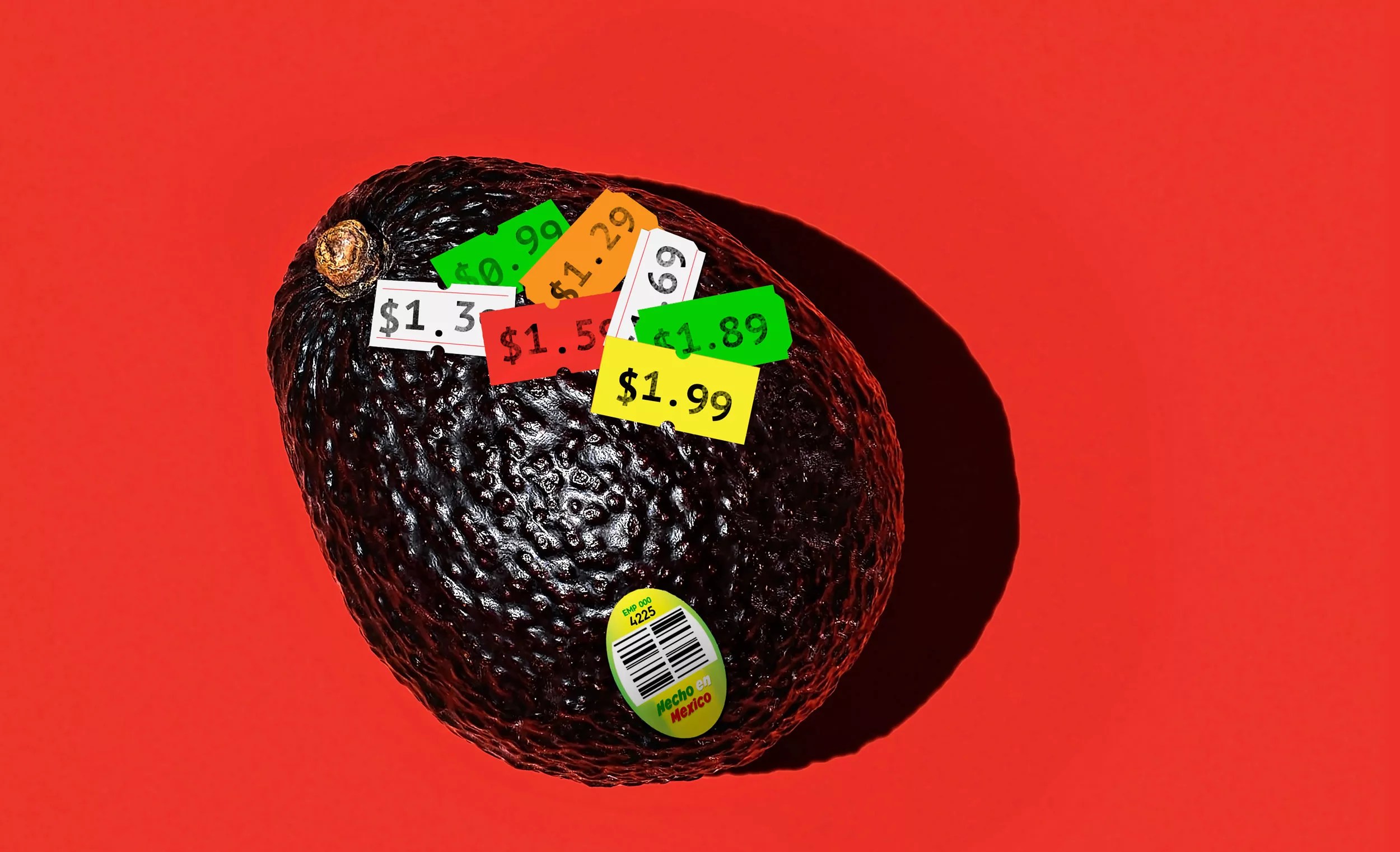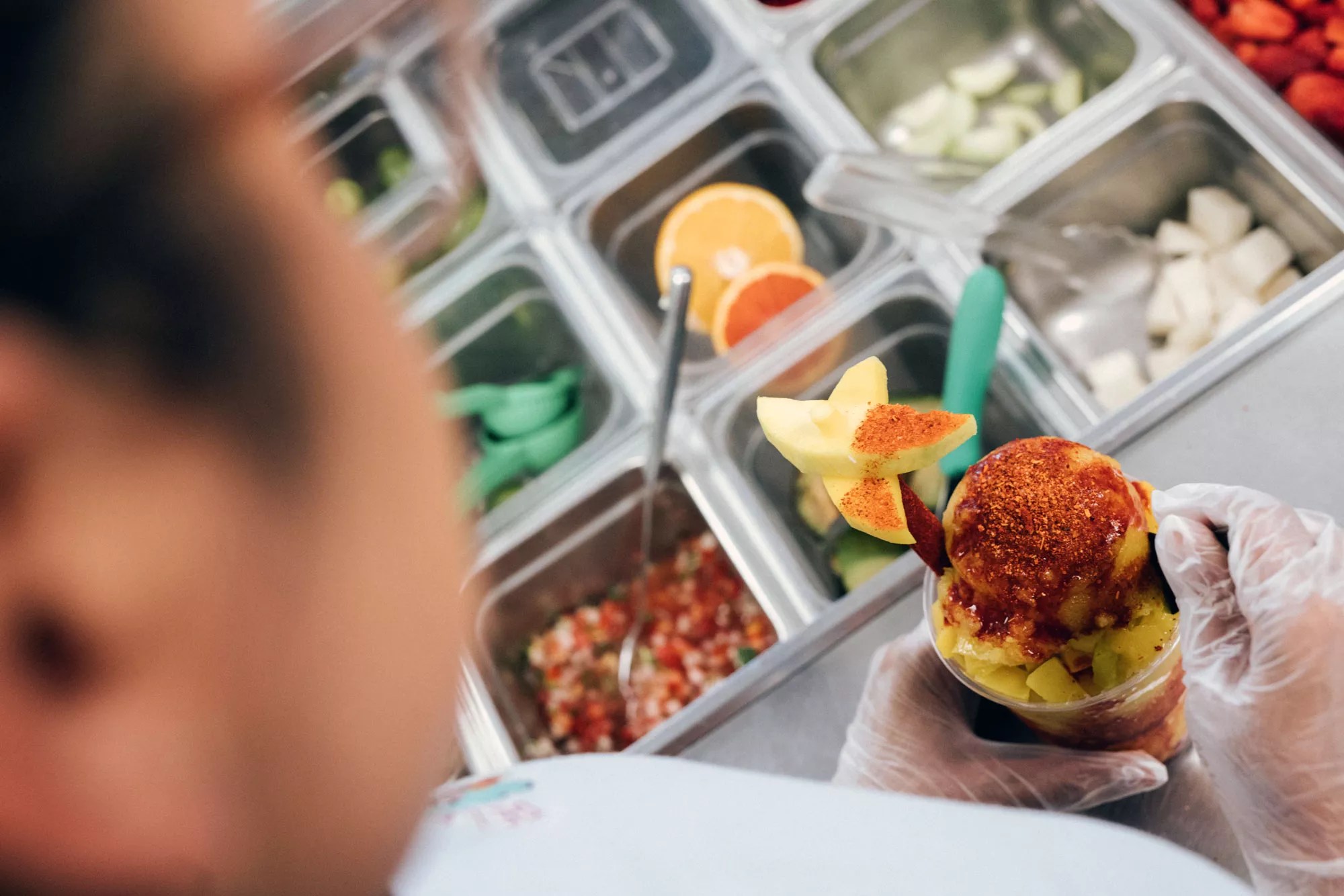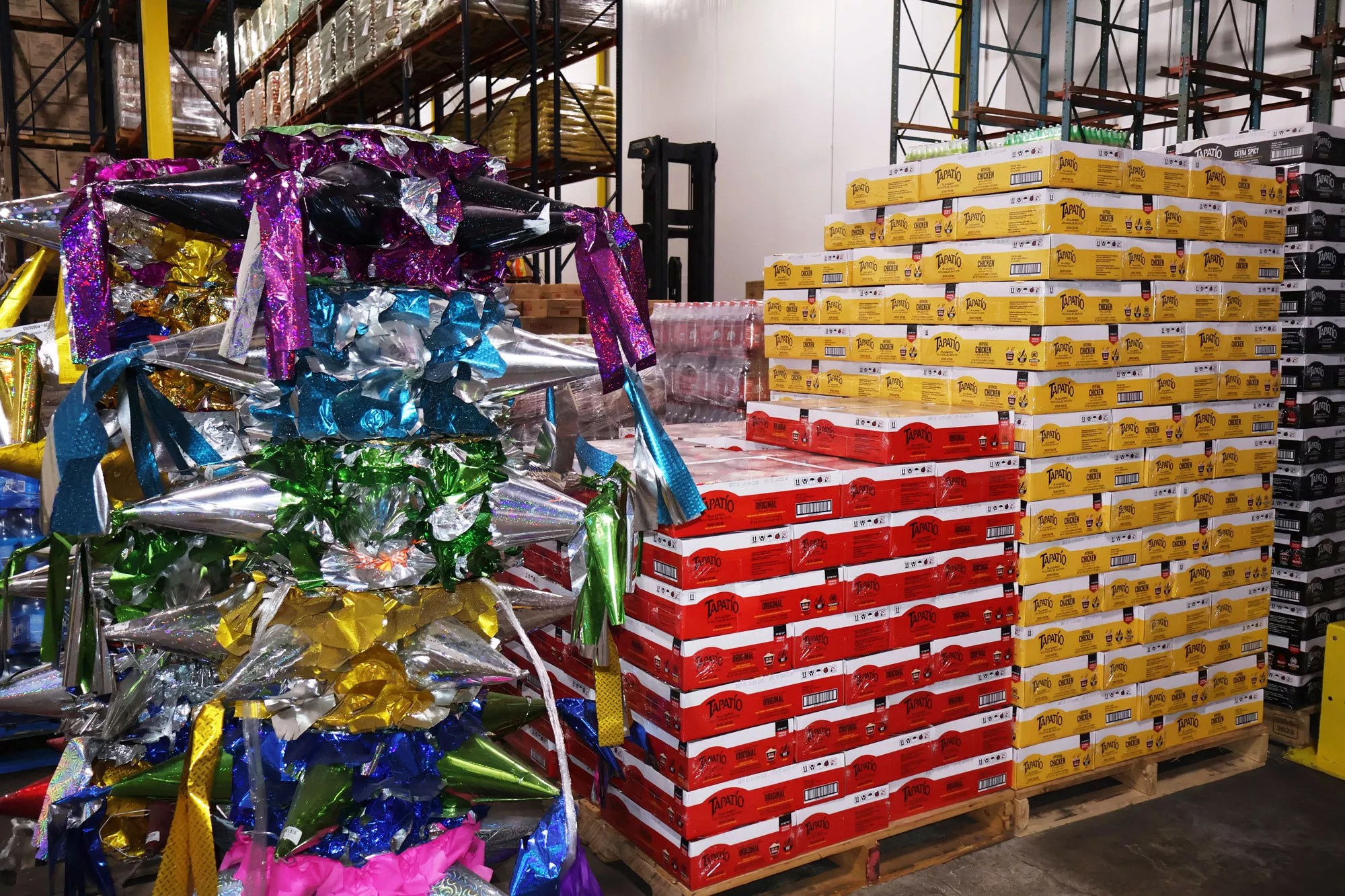
Sarah Schumacher

Audio By Carbonatix
In one corner, a young girl fills a tray with her favorite fresh Mexican sweet bread. A family 30 feet away orders food from the taquería before finding a seat in one of many booths. The meat market is all the way in the back of the store, where the butchers take orders while listening to their favorite Norteñas, a subgenre of regional Mexican music.
Across the store, a woman sifts through avocados, looking for the ripest ones perfect for guacamole. She stops at the fruteria to order a fresh, in-season fruit salad before checking out at the cash register. This is but a typical day at La Michoacana Meat Market in Carrollton, an all-in-one Latino store.
Most, if not all, of the grocery items in La Michoacana are from Mexico.
“They like it here because they find all the products from their countries, and … they find everything here at low prices,” says store manager Abelina Rodriguez. “Here, you can find everything from a taquería, a meat market and bakery. You don’t need to go to another place to buy something else; you can even buy ready-to-eat meals to share with the family.”
But Rodriguez says she has noticed a drop in shoppers recently. She believes it is likely due to new immigration orders affecting the Latino community and fluctuating tariff directives from President Donald Trump’s administration testing their limits. Most recently, the administration issued a 25% tax on all imports from Mexico and Canada that went into effect March 4, which Trump says in response to fentanyl trafficking at the northern and southern borders.
But just two days after imposing those sweeping tariffs, Trump issued a one-month exemption for various goods coming from Mexico that fall under the United States-Mexico-Canada Agreement (USMCA), a free-trade pact that applies to roughly 50% of Mexican imports.
This back-and-forth on tariffs comes as no surprise – it’s the second time Trump has backpedaled after threatening tariffs in nearly two months. This has left the Latino community and businesses wondering what will happen in another month and whether he will change his mind again.
The constant fluctuation is giving companies and distributors tariff whiplash.
“We have to be constantly monitoring what tariffs they are putting on the border and what Trump said; all of a sudden he puts it on, all of a sudden not anymore,” says Gibran Licona, director of operations for Nogales Produce Inc. “We had already gone through a month with them saying they were going to be applied, then all of a sudden he says they were going to be applied in a month, which was this past Tuesday. Then they went into effect, and today we get news that they are going to pause the tariffs once again.”
Nogales Produce Inc. is a full-line distributor that sells produce, grocery items and restaurant supplies to over 2,000 businesses in the Dallas-Fort Worth area, West Texas, Houston, San Antonio and five other states.
While Nogales does not directly import goods from Mexico, the company monitors demand and works with agencies, like Villanueva International LLC, a full-service international import and export brokerage agency that gets products across the border.
Licona wants a straightforward plan so they can prepare for the future.

Nogales Produce Inc. continues on with business, the threat of tariffs and increased costs looming.
Melanie Hernandez
“It would be very good to have clarity because these tariffs affect everything, the entire chain, not only us but many companies, many businesses and if we want to continue doing business, we need to know the percentage of the final tariff,” Licona says. “… Unfortunately, the final consumer will be affected because everyone will pay their 25% or whatever percentage is.”
Mea Ahlberg, senior lecturer on economics at Southern Methodist University, believes that the tariffs, to some extent, have already started a trade war.
“Tariffs are an old bargaining chip,” Ahlberg says. “But pressed too far, they can boomerang. They may, for instance, force trading partners to look to U.S. competitors like China or seek alliances that in the long run would be harmful to the U.S.”
Ahlberg doesn’t anticipate immediate price fluctuations for consumers because of tariffs (or lack thereof), as the effect of policy changes tends to lag. But threats alone can have an effect.
“Markets could react faster if uncertainty and fear induce volatility. This will lead to higher prices for products such as car components, electronics and food, as well as shifts in the supply chain,” Ahlberg says.
Even though Trump has paused tariffs for another 30 days, Licona says U.S. Customs and Border Protection has already stopped grocery products like candy, canned goods, drinks, and detergents. Trump honoring the USMCA means imports like tequila, beer, coffee, and all agriculture and produce should remain untaxed and free to move across the border.
The pause on tariffs for USMCA goods expires on April 2, after which Trump has threatened another round of global tariffs. Nogales and other Latino businesses will have to raise prices to compensate for the added costs. Companies must decide whether to absorb the fees and cut costs elsewhere or pass the increase on to customers.
‘Everyone Buys’
Antojitos y Frutería Mama Luchonas in Irving has already felt the effects of rising prices due to inflation alongside other struggles in the Latino community since Trump entered office.
“In the location I am at, we have seen how much more expensive products are now, so we have no choice but to raise our prices, and I imagine a lot of people will no longer be able to afford these things,” says store manager Alva Mendoza. “There are so many people right now without a job, and everything that is happening in this area accumulates and affects people.”
Not only will it have consequences for customers, Mendoza says, but for employees of these businesses.
“If things get worse, they already told us they might have to let people go,” Mendoza says.
Some Latino businesses have already taken a hit whether the tariffs are imposed or retracted. Many undocumented immigrants are afraid to leave their houses, thus no longer frequenting the businesses once part of their routine. This, mixed with rising grocery prices since the start of the Trump term, is hurting immigrant communities.
“Businesses have been affected, and people are already not going to these places as much because a lot of products have risen in price and because of the people who are afraid to leave their house,” Mendoza says. “The truth is it will affect everyone, as much as the Hispanic people and those who are legal here because we all consume. Everyone buys.”

De La Cream Fruteria in Irving hasn’t raised prices but fears they will have to if tariffs are added to many of the goods they buy.
Nathan Hunsinger
Latinos have a high consumer rate in the U.S. In 2022, the U.S. Latino GDP reached $3.6 trillion, according to a report by The Latino Data Collaborative Think Tank, a nonprofit that researches the contributions of American Latinos to the U.S. economy. That GDP figure surpasses Canada, China and India, making U.S. Latinos equal to the fifth-largest global economy.
Lincona says it can become very complicated when this massive buying cohort is forced to change their food routines.
“We Latinos are very attached to the food that we bring from tradition, and you are going to see a lot of impact on the final consumer. That can affect the economy in the state and throughout the country,” he says.
The Latino community is aware of its spending power. Feb. 3 was A Day Without Immigrants: businesses closed, and people skipped work or school to demonstrate the impact Latinos have in their communities.
“Given the raids and the immigration agencies and what is happening with many of the people who are returning to their countries, it is already stressful. Now add that to tariffs, making it more expensive to eat and to get their food; it is a bomb for the Latino people,” Licona says.
De La Cream Fruteria is a family-owned business in Irving that sells Mexican foods and products. Denys Armas, the owner’s daughter, says they haven’t raised prices because her supplier has not, but she knows the future implications.
“He’s going to destroy us. He’s going to push until businesses are buried,” De La Cream owner Magdalena Lopez says of Trump. She’s hopeful the tariffs will not threaten their business’s future.
“I just feel like there could be a better way for the United States and Mexico to come up with a plan where they don’t have to tax each other, especially since we’re neighboring countries,” Armas says. “I just hope that happens, but we will kind of just have to deal with what we get.”
The ‘Uncertainty Tax’
Late last week, Emily Williams Knight, president and CEO of the Texas Restaurant Association, shared an update on YouTube, cautioning restaurants to use the 30-day tariff reprieve to make plans.
“That looks like looking at all the goods that could be impacted again in 30 days and thinking about if you could source any of that locally; it’s working with your suppliers and distributors; it’s thinking through menu items and those items that may become more costly,” Knight said.
She assured that her organization continues to educate lawmakers and called out the unpredictable nature of the tariffs.
“It’s this constant swinging back and forth, what I like to call the ‘uncertainty tax,'” Knight says.

Nogales Produce Inc. struggles to plan for future business as it confronts the many mixed messages about tariffs.
Melanie Hernandez
Licona shared a sentiment similar to Knight’s message regarding the next steps for business owners in these indecisive times. He says business owners should stay vigilant of the current tariff conditions and pay attention to their distributor’s actions to avoid the risk of getting taken advantage of.
“If they continue to maintain tariffs that come and go, I feel that they are playing with the Latino society and the Latino economy that contributes a lot to the country, and that will bring consequences,” Licona says.
As the Latino community continues to navigate prices, some have used online social media and humor to cope. Some users showed traditional, low-cost Mexican meals they grew up eating, like rice, charro beans, sopa de fideo (noodle soup) and picadillo.
One TikTok user posted a video of her making a classic Mexican breakfast: huevos con salchicha (eggs and hotdog), refried beans, and tortillas. The caption read: “Tariffs coming soon, but this is my childhood food, so we’ll be okay.”
Regardless, businesses offering Mexican products will face hard decisions if tariffs are implemented.
“Quite a lot of sales will go down, and many people will not be able to buy the products,” Rodriguez at La Michoacana Meat Market says. “The taxes might be reflected in the prices sooner than we think.”